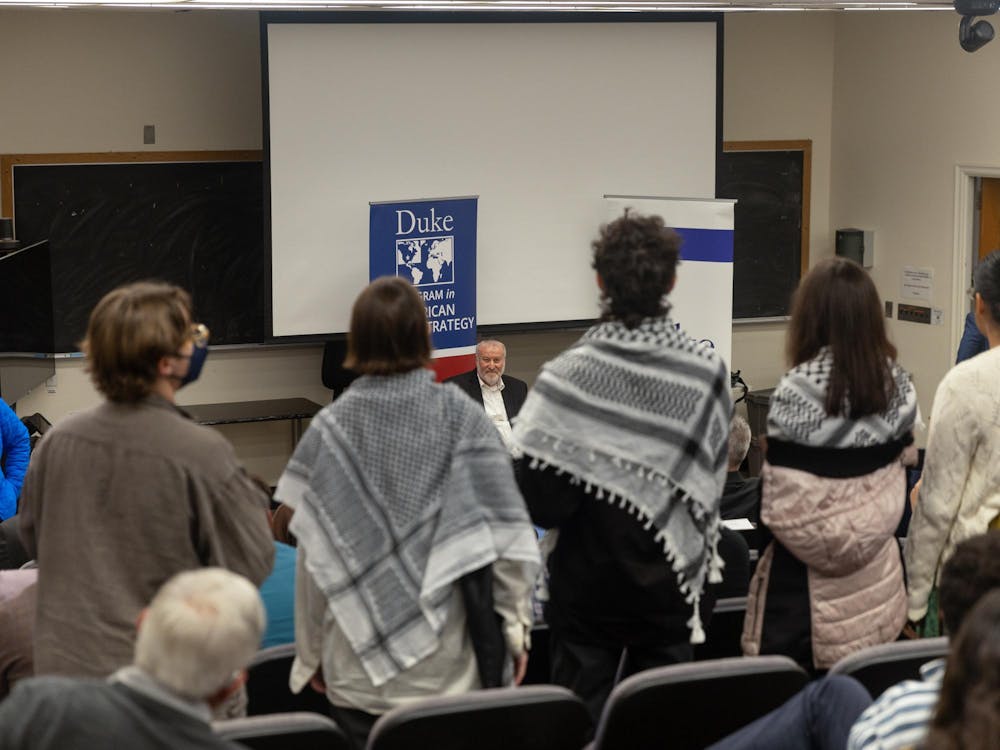Pro-Palestinian student protesters interrupted a talk featuring former Israeli Attorney General Avichai Mandelblit, who shared his perspective on Israeli foreign policy during a Tuesday event hosted by the Duke Program in American Grand Strategy.
Mandelblit, one of Israel’s foremost experts on international conflict law, has served in various roles in the Israeli government, including chief military advocate general and cabinet secretary. He was attorney general from 2016 to 2022 under Prime Ministers Benjamin Netanyahu and Naftali Bennett and spent a portion of his career in the Israeli Defense Forces’ legal system.
In 2019, Mandelblit indicted Netanyahu on charges of bribery, fraud and breach of trust — the first time a sitting prime minister was prosecuted in the country. “The public interest requires that we live in a country where no one is above the law,” Mandelblit said at the time. Netanyahu is set to stand trial in just under two weeks for the three cases, which will have dragged on for exactly five years as of Thursday.
The protesters, who chanted slogans including “Avi, Avi, you can’t hide, we charge you with genocide” and “free, free Palestine,” gathered on Abele Quad around 5 p.m. before marching to the Social Sciences Building, where the event was scheduled to take place at 5:30 p.m.
After a brief verbal protest, the students exited the room and continued to chant outside the lecture hall for the remainder of the discussion.
“It's frustrating because if you care about simple dialogue as I do, you want to hear the charges, and you want to hear the response,” said Peter Feaver, AGS director and professor of political science and public policy who moderated the event. “And of course, that was not dialogue.”
Feaver began by asking Mandelblit to elaborate on his previous role as the chief military advocate general, to which Mandelblit stressed the job’s independence from traditional military hierarchies.
Mandelblit claimed that this separation of military lawyers from the chain of command is intended to ensure that legal advice is not swayed by political pressure and remains “within the law.”
“International law applies to Israel, … military laws of armed conflict,” he said. “There is no difference [for Israel].”
Mandelblit followed up by reaffirming the International Humanitarian Law, a set of rules governing proper conduct of war that includes a principle of distinguishing between soldiers and civilians. However, he admitted that this principle could be difficult to follow due to the challenges of “asymmetric warfare in urban areas.”
He noted that Hamas’ war tactics complicated Israel’s efforts to minimize harm.
Feaver questioned Mandelblit on the Biden administration’s growing concerns surrounding Israel’s “attention to proportionality” towards violence against Palestinians — the principle of weighing military advantage against potential harms to civilians.
Mandebilt countered by providing examples of Israel-supported humanitarian routes in Gaza for Palestinian civilians, saying that providing humanitarian aid is not a privilege granted by Israel to the residents of Gaza but rather an “obligation to support and address the humanitarian needs.”
“If Israel would want to extinguish the Palestinian people, then why would they let them open humanitarian corridors, telling them to get out of northern Gaza through … corridors to a safe zone, which is Al-Mawasi in the southern part of Gaza, in order to protect them?” he asked.
As the protesters’ voices continued to echo within the classroom, Feaver asked Mandelbilt his thoughts regarding the slogan “from the river to the sea.”
Mandelblit responded by providing an anecdote from his time as a military judge 25 years ago, when he prosecuted several Palestianians for lynching Jewish Israelis. One of those tried was only 14 years old.
“‘I was there, I saw him [and] I burned him, but he is not a human being,’” Mandelblit said, recounting the boy’s testimony. “‘Everybody knows that the Jews are the son of [the] devil … and when they come to our land in Gaza they conceive the odds of death.’”
The experience reaffirmed Mandelblit’s view that Hamas’ ideology advocates for a complete extermination of the Jewish state.
“Now the only way to change it is education and coming to the reason that, at the end of the day, there are two people living in this land, and we should find a way to keep building both people,” Mandelblit said.
Editor’s note: A previous version of this story misquoted Mandelblit as saying a 14-year-old Jewish boy was killed in a lynching, when in actuality a 14-year-old Palestinian boy was prosecuted for participating in the crime. The Chronicle regrets the error.
Get The Chronicle straight to your inbox
Sign up for our weekly newsletter. Cancel at any time.

